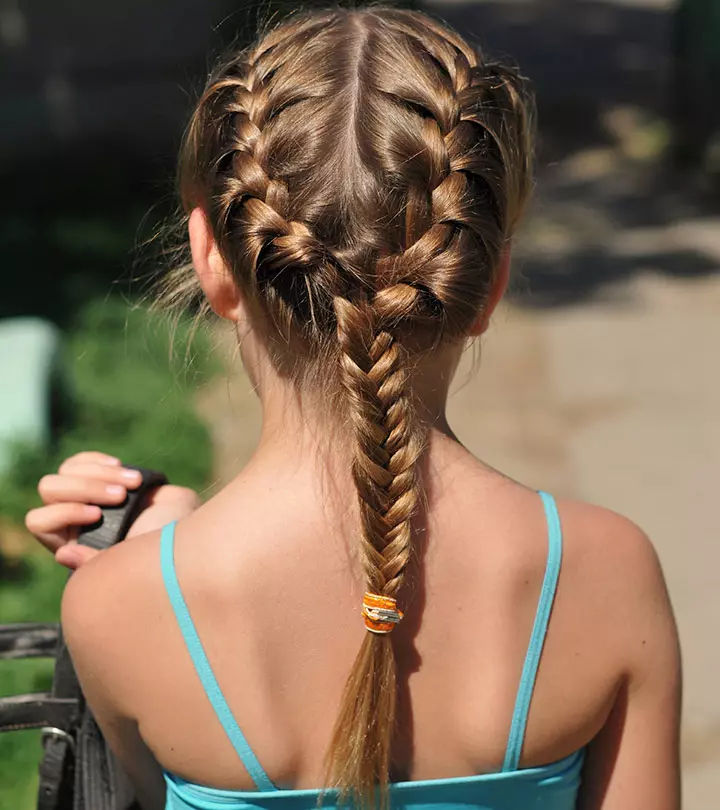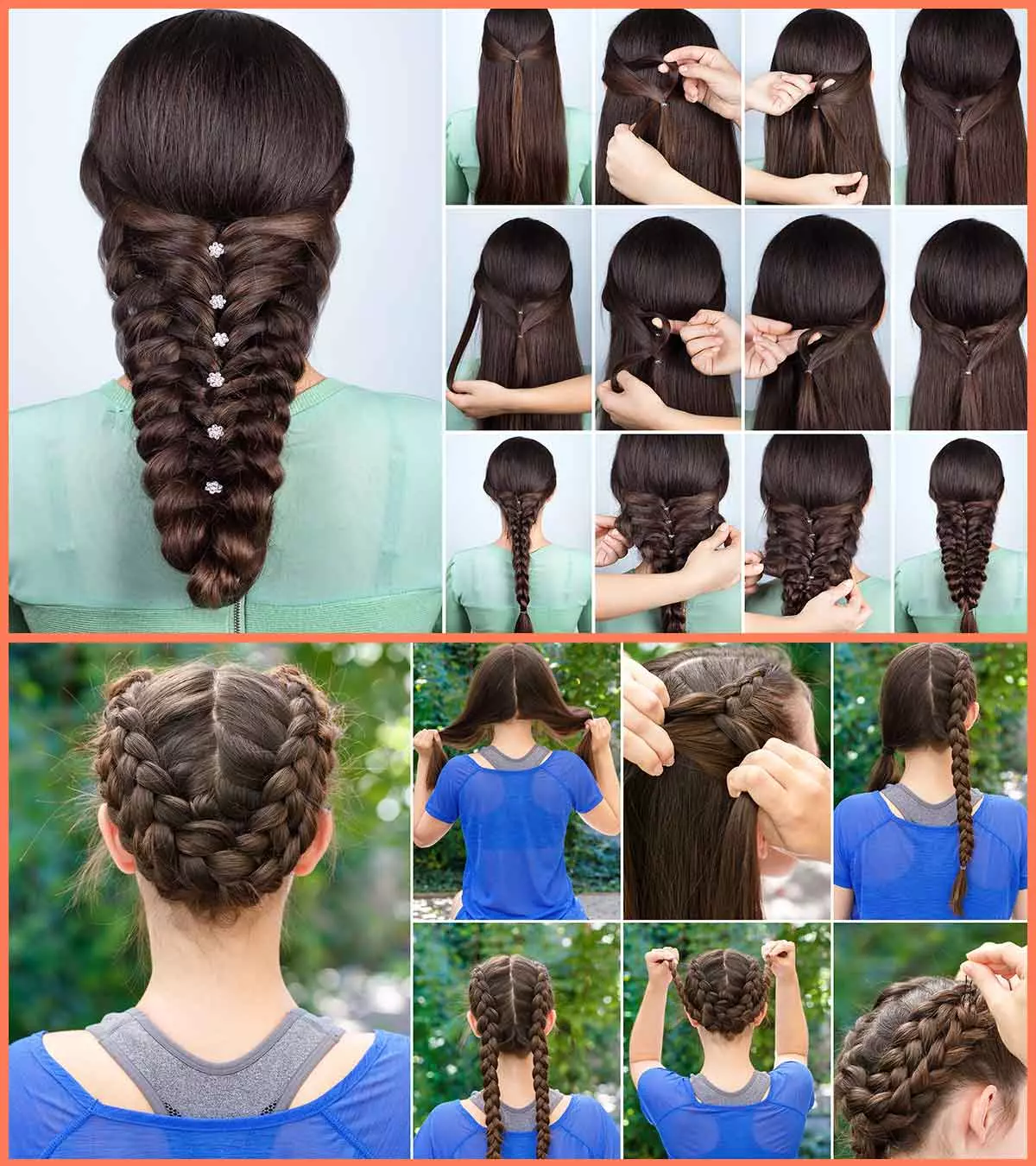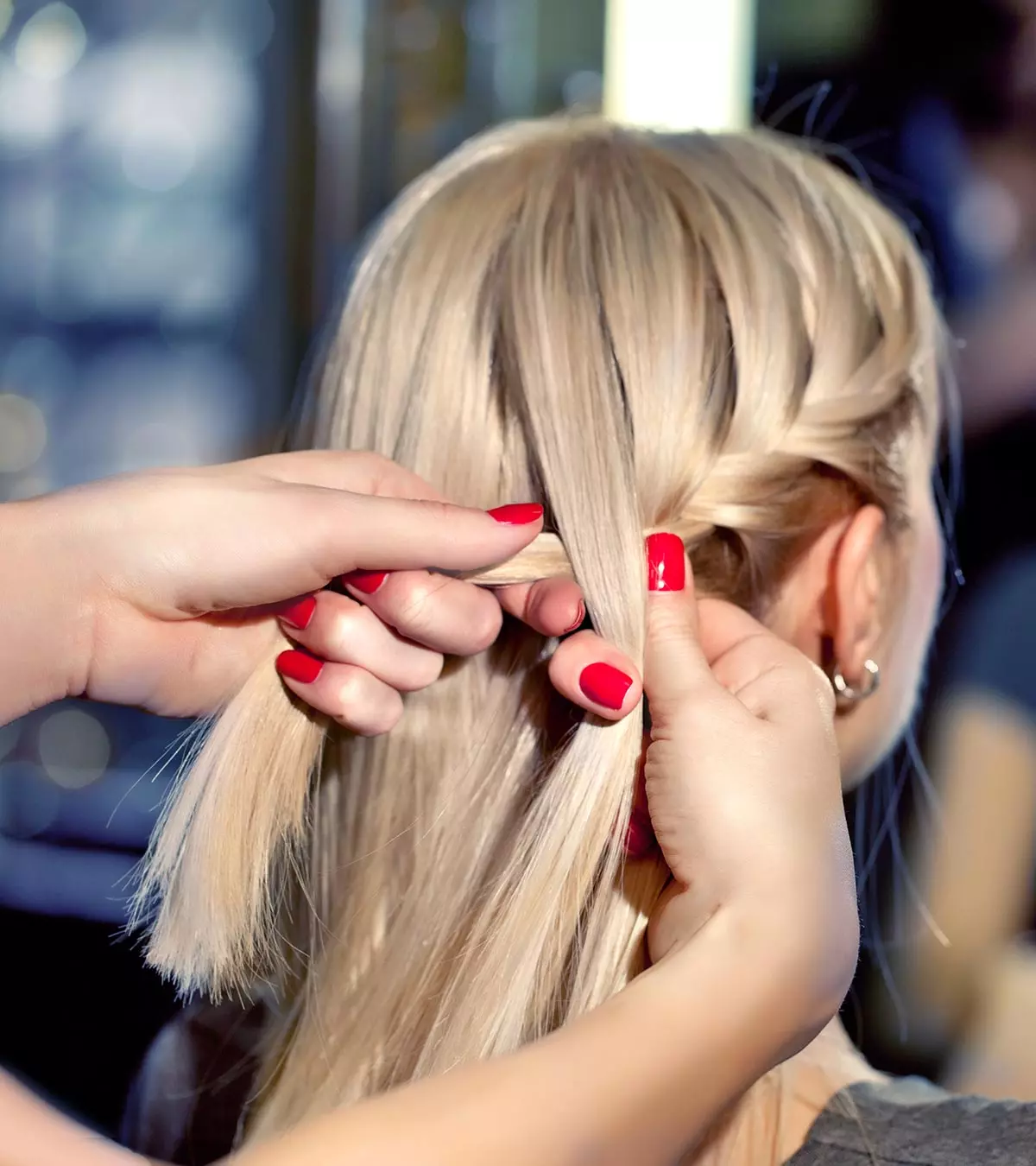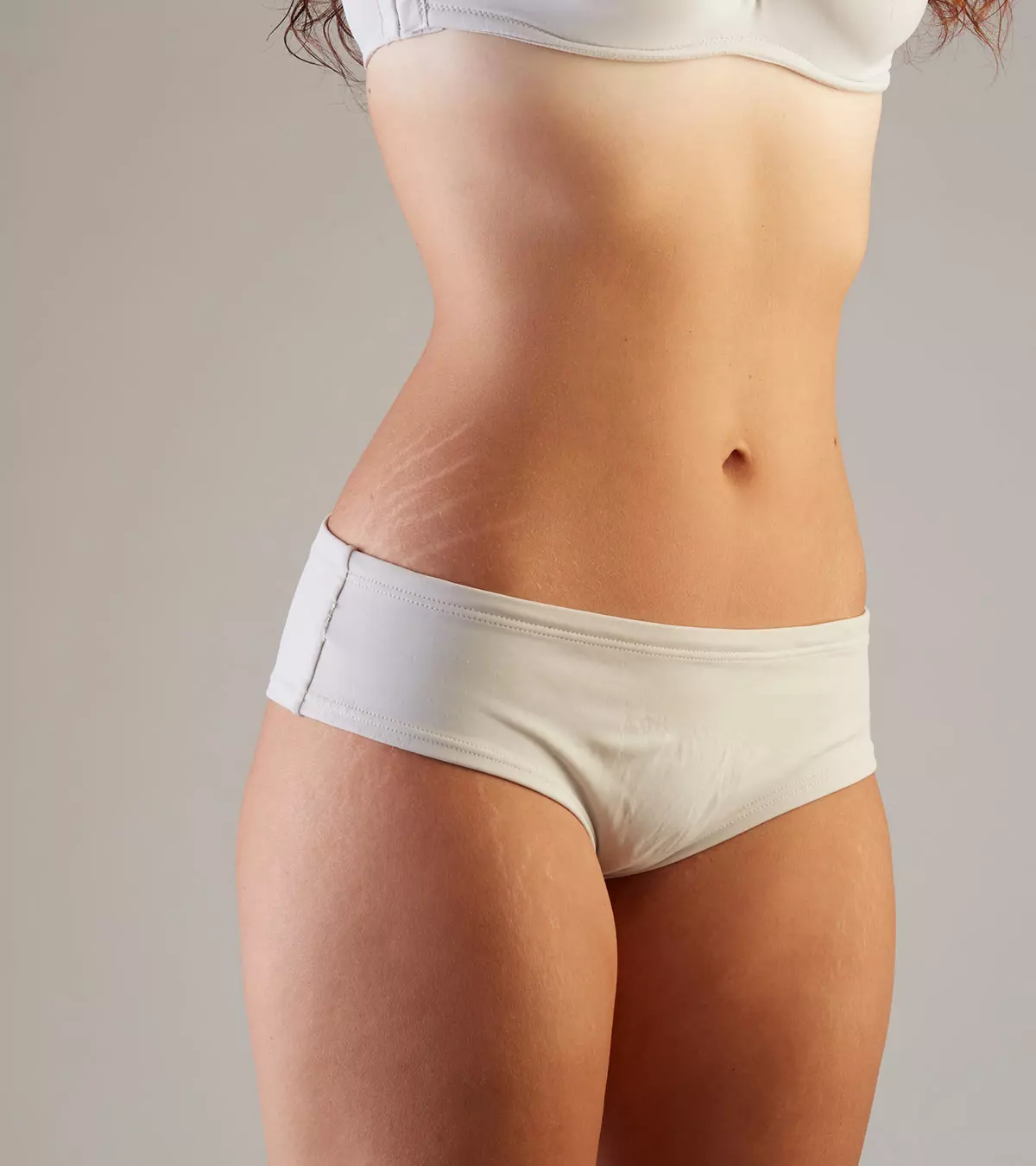
Image: Shutterstock
Stretch marks appear when the skin is stretched excessively due to growth or weight gain. Stretch marks in teenagers are common, especially as they approach puberty, because of the rapid changes in their bodies. They are not painful. You may consult a dermatologist if your teen is concerned about their appearance. Stretch marks in teenagers have several origins, symptoms, diagnoses, treatments, and preventions, as discussed in this post.
Key Pointers
- The areas around the abdomen, hips, and thighs of teenagers often develop stretch marks.
- Stretch marks can be caused by rapid muscle growth, weight gain, or puberty.
- The likelihood of developing stretch marks increases due to being overweight, rapid weight changes, or prolonged use of corticosteroid medications.
- Common treatments for removing stretch marks include applying retinoid gels, microdermabrasion, micro-focused ultrasound therapy, and laser therapies.
Where Do Stretchmarks Appear On Teen’s Body?
Stretch Marks are tiny tears that occur in the dermis, which is the second layer of the skin (1), and usually appear on the abdomen, hips, thighs, legs, and chest (2). However, they can appear at any place where the skin is overstretched. They are a form of scarring that occurs when the skin is pulled by rapid growth or stretched due to pregnancy, puberty, or rapid weight gain. Extreme stretching can cause purple or red scars due to changes in the connective tissuesiA framework that supports the organs and other tissues in the body, giving it cohesion and structure. and collageniA structural protein of the body that helps build the connective tissue, skin, bones, and tendons and provides flexibility. fibers within the skin.
Gemma, a plus-size Scottish blogger, diagnosed with M.E. or Post Viral/Chronic Fatigue Syndrome, opens up about her feelings about her body. She says, “My thighs are wobbly with deep stretch marks which have been there since my (thin) teens. My boobs have stretch marks too, as does my bulging belly and my waist-size ain’t what it used to be. My outer thighs show signs of cellulite and I have a double chin from (most) angles. There’s a whole list of things I don’t like, but there’s also plenty I do. I like my decolletage, my arms, my lower legs and my waist (even if it isn’t as thin as it used to be). Those stretch marks to me are a story of my life, my battles with my weight (i).”
Signs And Symptoms Of Stretch Marks In Teenagers
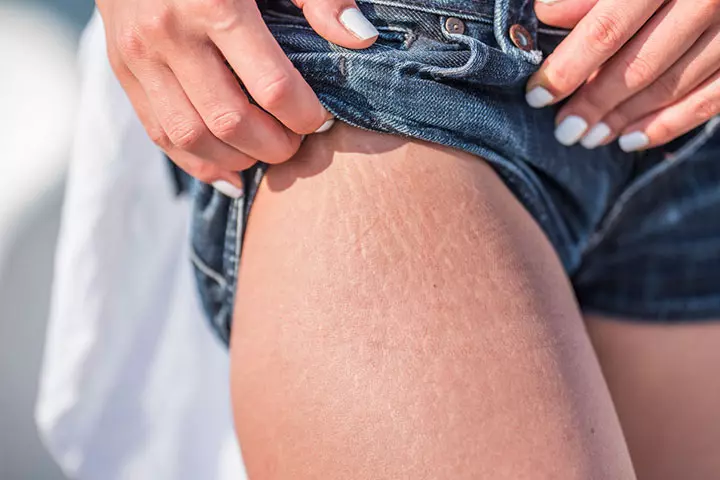
The appearance of stretch marks may vary depending on the cause, duration, location, and type of skin. Usually, the following variations are noticed on the skin (2) (3).
- Indented (edges with zigzag line) streaks
- Lines on the skin
- Bright streaks or fade streaks
- Streaks covering major parts of the skin
- Pink, red or purple colored streaks
- Black or blue streaks
Over time, darker streaks may fade to lighter colors. Also, despite being harmless physically, it may adversely affect your teen’s self-esteem. Therefore, having an open conversation with your teen about stretch marks is essential to help them adapt to these natural changes.
Causes Of Teenage Stretch Marks
Any factor or condition that causes overstretching of the skin could result in stretch marks. Puberty, rapid muscle growth, weight gain, or rapid teenage growth spurt can be some of the causes for stretch marks in boys and girls (1) (3) (4).
Remember that the severity of the stretchmarks may vary depending on the skin type, genetic factors, skin elasticity, and cortisoliThe primary stress hormone of the body, which comes into action in a fight or flight response. levels. Cortisol is a hormone produced in adrenal glands, and increases the elasticity of skin fibers (5).
Risks Of Developing Stretch Marks
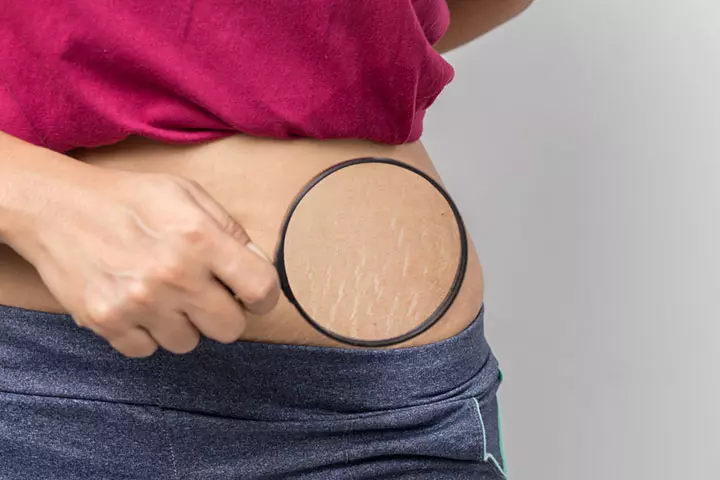
Anyone in puberty can get stretchmarks on the skin. However, the following factors may increase the possibility of getting stretchmarks (3) (4).
- Female gender
- Family history of stretchmarks
- Being overweight or obese
- Rapid weight loss or weight gain
- Long term use of corticosteroid medications (oral or topical steroid)
- Cushing’s syndrome (high levels of cortisol)
- Marfan syndrome (connective tissue disorder)
When To See A Doctor?
You may consult a pediatric dermatologist if your teen is concerned about the appearance of the skin. It is also good to see a doctor if stretchmarks are accompanied by other conditions, such as rapid weight gain, skin bruising, etc. Doctors can help identify the cause and initiate the treatment for the underlying cause if required.
Diagnosis Of Stretch Marks
Stretchmarks can be diagnosed on the physical examination of the skin. Your doctor may obtain a detailed medical history.
Blood tests and urine tests may be ordered to determine the level of cortisol. This can also be done by the dexamethasone suppression test, which is the collection of blood samples after taking a steroid (dexamethasone) pill (6).
 Point to consider
Point to considerTreatment For Stretch Marks In Teenagers
If there is an underlying cause of concern, then your teen’s doctor may initiate treatment for the condition. If stretchmarks are caused by obesity or overweight, then the teen would be guided by a nutritionist for a healthy diet and workout regime.
Stretch marks can fade away over time and are harmless. Treatments may only partially remove/diminish stretch marks. The best way is to identify and treat the underlying cause and maintain a healthy weight so that these marks may disappear over time.
The following treatments may be given to improve the appearance of stretchmarks. None of these methods has been proven to be highly effective. A dermatologist may recommend any of the following treatments (5) (7).
- RetinoidiChemical compounds with vitamin A-like activities that aid in vision, growth, reproduction, and other biological functions. creams, lotions, or gels: These are derivatives of vitamin A. TretinoiniA medicated topical cream used to treat acne, wrinkles, and sunburns. is one of the retinoid skin care creams which is available as Retin-A, Renova, or Avita. Stretchmark creams can be applied to the skin, and they may help rebuild the skin collagen fibers and make them look somewhat like normal skin. However, note that it may cause skin irritation in some individuals. Prolonged use and higher doses of these retinoids may also cause side effects such as skin redness, excessive dryness and scaling, and itchiness (8).

- Laser and light therapies: These therapies stimulate the production of collagen and elastin of the skin.
- Microdermabrasion: This treatment uses a hand device to blow crystals that remove a fine layer of the skin. It could eventually stimulate the growth of more elastic skin.
- Non-ablative radiofrequency: It involves treatment with special radiofrequency devices to promote collagen growth.
- Microfocused ultrasound therapy: It is also known by the brand name Ultherapy. This method uses ultrasound waves to promote collagen growth and regain skin elasticity. Apart from the above methods, a chemical peel can also be employed as a procedure by dermatologists to reduce the visibility of stretch marks (7).
These procedures may cause some redness or swelling; however, the effects are generally temporary and may disappear in a few hours or days.
The American Academy of Dermatology Association (AAD) states that some of the skin products or topical treatments marketed to lessen or fade stretch marks may work, given the following instructions are followed (7).
- Apply products when the stretchmarks are new; mature stretchmarks are difficult to remove
- Massage the product gently over the marks to enhance its effectiveness
- Apply a product for a few weeks daily to get results

Researchers say that home remedies, such as massaging almond oil, coconut oil, olive oil, vitamin E, and cocoa butter, are not shown to be effective (7) (9).
The dermatologist may recommend treatment depending on the skin type, cause, convenience, cost, and expectations. Do note that dermatologists may not encourage teens to undergo microdermabrasion and laser surgery for stretchmark removal since teens are growing, and new stretchmarks may appear.
 Quick tip
Quick tipHow To Prevent Stretch Marks During Puberty?
There are no proven procedures or medications to prevent stretch marks in puberty. Most stretch marks fade away over time (5). However, some preventive methods may help. These include (9).
- Healthy weight: The best way to decrease the chances of developing stretch marks during teenage years is to maintain a healthy weight.
- Healthy and balanced diet: Parents need to discuss with their children the need for a healthy diet to avoid excess weight gain. Including certain foods rich in zinc (nuts and fish), vitamins A, C, and D (milk and citrus fruits), and protein (lentils, chicken, beans) can also promote healthy skin.
- Regular exercise: Exercising regularly can help you manage weight and also promote increased blood circulation and collagen production, thus making the skin healthy, flexible, and plump.
- Proper hydration: Drinking plenty of water and juices is crucial for maintaining skin softness and reducing the likelihood of stretch marks. However, avoid caffeine as it may increase the risk of developing stretch marks.
John Anthony, MD, a dermatologist at the Cleveland Clinic, says, “Stretch marks have a life of their own. I recommend the tincture of time. As time goes on, stretch marks become less prominent. They start out red or purple, but they fade on their own over time (10).”
How To Make Stretch Marks Less Noticeable?
The following may make stretchmarks less noticeable (11).
- Sunless self-tanners: Sunless self-tanning lotions, sprays, or creams could help camouflage the stretchmarks. Do note that regular self-tanning will not help reduce stretchmarks or make them disappear (7). Instead, they might make the stretch marks more obvious.
- Makeup: You may ask your teenager to try water-resistant, cover-up body makeup to hide the marks if they are concerned about it.
- Covering with clothes: You could also suggest your teens choose dresses that could cover the marks. For example, wearing bathing suits with more coverage can help hide stretch marks on the upper thighs, stomach, and buttocks area.
You will find several skin products that claim to help get rid of stretch marks. But, it is important to note that many of these products do not work or are expensive. The AAD suggests that skin care products containing the herb Centella or the component hyaluronic acid may work (7).
Annette Richmond, a writer and blogger, believes in the representation of all body types and is big on self-love. She narrates her journey with her body and stretchmarks. Initially, she shares, “All I wanted was for the stretch marks to stop growing and my body go back to normal. I would try every cream imaginable, look up stretch mark removal procedures on my family computer, and try to eat differently.”
She also thought, “I needed to be skinny and once I was skinny enough, the stretch marks disappear.”
But over time, she realized that the stretch marks were there to stay. That is when she concluded, “I can either sit here and hate my body like I spent a good chunk of my life already doing OR I could come to terms with my body and the way it looks and let myself be the fabulous woman I feel like I am destined to be deep down inside.” And ultimately, she decided to start loving her body and “living unapologetically (ii).”

Frequently Asked Questions
1. How long does it take for teenage stretch marks to fade?
The time it takes for stretch marks to fade varies from person to person and can be influenced by various factors such as skin type, age, and the severity of the stretch marks. In general, newer stretch marks tend to be red or purple and will fade to a lighter color over time. Studies show stretch marks may take 6 to 12 months to disappear without treatment. However, they may fade faster with treatments including prescription creams and laser treatments (7).
2. Can aloe vera gel clear stretch marks?
There is no scientific evidence to support the claim that aloe vera gel can clear stretch marks. Stretch marks are scars that occur when skin is stretched rapidly, such as during puberty or pregnancy. While aloe vera gel may help moisturize the skin, it is unlikely to affect the appearance of stretch marks.
3. Do stretch marks have any long-term health implications for teenagers?
Stretch marks usually do not pose any significant long-term health risk. However, they may cause slight discomfort, and teenagers may feel self-conscious about the appearance of these marks on their skin.
4. Can exposure to sunlight or tanning beds worsen the appearance of stretch marks in teenagers?
Yes, tanning and excessive sun exposure can increase the visibility of stretch marks (12).
Stretch marks in teenagers are common. Your adolescent child may become conscious of the appearance of stretch marks and it could potentially affect their self-esteem. The occurrence and severity of stretch marks differ from one person to another. Overweight teens or those with a family history of stretch marks may be more prone to developing stretch marks. However, you should consult a healthcare professional if you notice other alarming symptoms, such as sudden weight gain, skin rashes, or any other abnormalities along with stretch marks.
Infographic: Causes And Risk Factors For Stretch Marks In Teenagers
Puberty brings about various physical and physiological events, which give way to inevitable bodily changes in teenagers. One such change could be the appearance of fine lines or stretch marks on the skin. This infographic discusses the possible causes and risk factors for stretch marks in teenagers. Illustration: Momjunction Design Team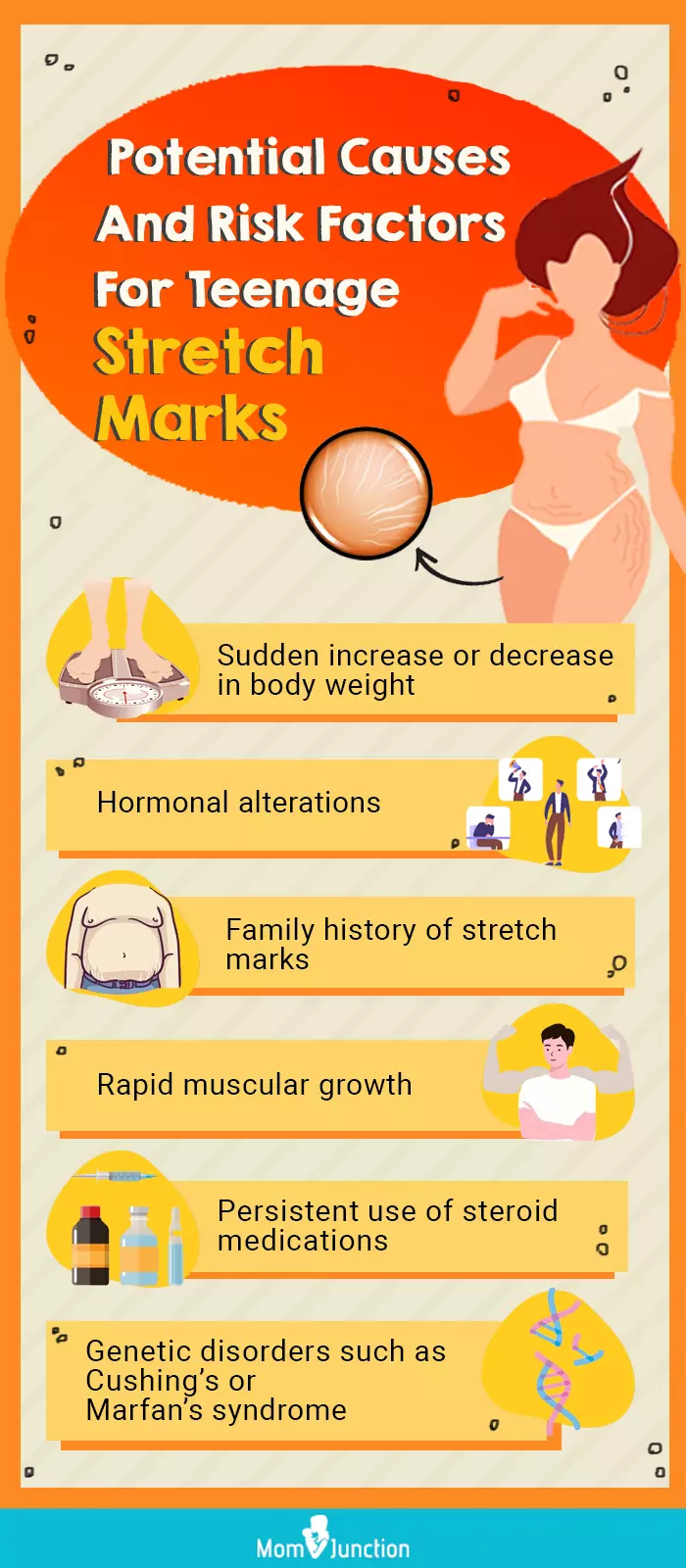
Illustration: Simple Ways To Treat Stretchmarks In Teenagers

Image: Dalle E/MomJunction Design Team
Personal Experience: Source
MomJunction articles include first-hand experiences to provide you with better insights through real-life narratives. Here are the sources of personal accounts referenced in this article.
i. You Are What You Are (Beautiful);
https://pinkhairedprincess.blogspot.com/2012/06/you-are-what-you-are-beautiful.html
ii. Learning to Accept my Stretch Marks : A Journey of Self-Love;
https://fatgirlstraveling.wordpress.com/2019/10/02/learning-to-accept-my-stretch-marks-a-journey-of-self-love/
References
1. Stretchmarks; Nidirect; The Government of Northern Ireland
2. Stretchmarks; St. Clair Hospital
3. Stretchmarks; The United States National Library of Medicine (NLM)
4. Stretchmarks; The National Health Service
5. Amanda M. Oakley and Bhupendra C. Patel, Stretchmarks (Striae); The United States National Library of Medicine (NLM) 6. Cushing’s Syndrome; The National Institute of Diabetes and Digestive and Kidney Diseases
7. Stretchmarks: Why They Appear And How To Get Rid Of Them; The American Academy of Dermatology
8. Retinoids, topical; American Osteopathic College of Dermatology
9. Stretchmarks; Cleveland Clinic
10. Cocoa Butter Won’t Help Stretch Marks, but These Options Can; Cleveland Clinic
11. Stretch Marks; Nemours Children’s Health
12. 10 surprising facts about indoor tanning; American Academy of Dermatology Association
Community Experiences
Join the conversation and become a part of our nurturing community! Share your stories, experiences, and insights to connect with fellow parents.
Read full bio of Dr. Deepak Jakhar
Read full bio of Dr Bisny T. Joseph
Read full bio of Harshita Makvana
Read full bio of Anindita Ghatak
















